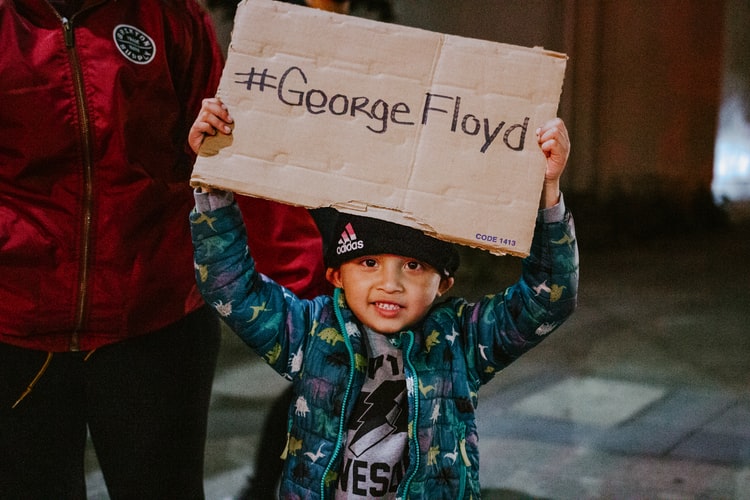The night before my flight to Beijing, my mother sat me down and we had a very serious one-sided conversation with her talking and me listening. Even though I was an adult, she felt the need to remind me of the golden rules for survival she drilled into me when I was a child. She reminded me that I was going to a foreign country where, as a black man, not everyone would be too pleased to see me. She reminded me that racism is real and that people like me die daily for just being who they are. She reminded me to toe the line, to never assume that anyone was on my side, to always have my own back, and to always watch out for trouble.
On a recent call with Geena Asiedu, an African American mom of three and an attorney based in Beijing, in the wake of George Floyd’s murder and subsequent global protests, I was reminded of that conversation with my mother. Truth be told, what my mother told me is far from the exception, but the rule for black parents to their black children. At some point in time or another, all-black parents are faced with the daunting task of having ‘the talk’ with their children, because their survival might well depend on it.

“Societal pressures faced by people of color around the world have been pushed to the fore.”
George Floyd’s murder in the states has served as a global catalyst for a movement against systemic racism and police brutality. Societal pressures faced by people of color around the world have been pushed to the fore. Black people the world over are coming out, sharing their experiences on social media platforms, and demanding change. People of color from countries like America have even chosen to move abroad, seeking respite from racial turmoil in their country, and countries like Ghana, Nigeria, and even China have become popular destinations for those wishing to escape prejudice and violence on account of their race. This is one of the reasons why Asiedu and her family decided to move to China ten years ago, as she wished to expose her daughters to a more international upbringing, with a plurality of cultures and races. But even Asiedu admits that the America her daughters might return to could be a far cry from their international upbringing in Beijing.
Asiedu has had to prepare her daughters for their eventual return to the States, a task that’s easier said than done. Whether learning to navigate macro aggressions such as overt racism, to microaggressions such as back-handed compliments, Asiedu admits it is a difficult but not entirely hopeless task to prepare her girls. Like all of our mothers, she has had to emphasize the importance of being above reproach to her three daughters. “If the mark is 100% then I would say to them, for you should work as if the bar was 110 to make it difficult for anyone to overlook you. Even if you get to the 110%, it’s not a guarantee to get what you deserve,” explains Asiedu, confessing that her daughters found this sort of pressure difficult to deal with at first. But it is this sort of pressure that is exerted by society on black people across the world, with perceived acts of wrongdoing by black people being met with excessive force, often ending in tragedy as it did for George Floyd.

Geena with family in a picture from the June issue of beijingkids magazine
The prevalence of this sort of violence against black people could cause emotional and psychological exhaustion as people of color adopt it as the new normal. “I don’t know how to describe it beyond disappointment, but it doesn’t fully capture the feeling. I was surprised that I felt so disappointed given that I knew the history of racial violence in the States. The lack of basic humanity the cop displayed with his knee on another man’s neck. Watching it on the screen, I couldn’t believe it,” explains Asiedu on her state after watching the footage of George Floyd’s murder, adding “I had to take a couple of days to harness my emotions, to remind myself to be hopeful and not to succumb to hopelessness and anger.”
Though she says she has never been a victim of racial profiling or discrimination in Beijing, she couldn’t escape the horror with which black and African people across China watched mass evictions of African migrants in Guangzhou. “My sentiment was that of sadness, ‘here we go again’. It makes you think okay, perhaps America doesn’t have a monopoly on racial discrepancy. Geography hasn’t got anything to do with it. We, humans, get very creative at mistreating others,” she says.

“I had to take a couple of days to harness my emotions, to remind myself to be hopeful and not to succumb to hopelessness and anger”
So in the wake of all these disturbing developments both in China and abroad, what is a mother to do? How does a mother reassure her children that the world is not as horrible a place as it is being portrayed to be, especially for people of color? The simple answer is honesty. “You have to put yourself in a situation where you are speaking your truth, moving in love, set your bar much higher, you make it fairly difficult for someone to take away the opportunity you deserve,” Asiedu says.
And to Beijing’s Black and African families she offers words of wisdom. “I believe it was Malcom X who said ‘There is pain in truth’ but you have to wrestle with the truth and feel the pain. Have those conversations not wanting to feel right, not wanting to feel better as a person, but with the hope of learning and listening more.”
KEEP READING: What Happens When Students Are Culturally Insensitive?
Photos: Uni You, Unsplash




